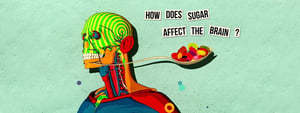Sugar is a word that we all know, and that we usually associate with a sweetening ingredient.
In fact, it is a general term, with a much broader meaning, and is used to describe a specific class of molecules called carbohydrates.
Glucose, fructose, sucrose, maltose, lactose, dextrose and starch are all forms of sugar.
It is found in a wide variety of food and drink: not only in sweets and desserts, but also in tomato sauce, yoghurt, dried fruit, flavoured water and cereal bars.
Since sugar is found everywhere, it is important to understand how it influences what we eat and how we behave.
In this video, the neurologist Nicole Avena shows us how sugar has a great effect on the brain’s reward system.
The bargaining chip of our reward system is dopamine, an important neurotransmitter (a chemical substance that channels information between neurons). When we eat something loaded with sugar, the activation of our reward system is no different from the way our body processes the substances that create addiction, like alcohol or nicotine: an overload of sugar increases our levels of dopamine and makes us want to eat more of it.
Let’s try to look at it now from another point of view and think about healthy diet. Let’s suppose that we are hungry and decide to eat a balanced meal. Great choice. However, if our diet is monotonous, something surprising happens:
If you eat that same dish many days in a row, dopamine levels will spike less and less, eventually levelling out. That’s because when it comes to food, the brain evolved to pay special attention to new or different tastes. Why? Two reasons: first, to detect food that’s gone bad. And second, because the more variety we have in our diet, the more likely we are to get all the nutrients we need. To keep that variety up, we need to be able to recognize a new food, and more importantly, we need to want to keep eating new foods. And that’s why the dopamine levels off when a food becomes boring.
The purpose of this system therefore is to encourage us to rotate our food as much as possible, so that we don’t embed mistakes in what we eat.
If we rarely eat sugar or just eat a little at a time, the effect is similar to that of a balanced meal. But if we eat too much, the dopamine response does not level out.
In other words, eating lots of sugar will continue to feel rewarding.
And so, this is how sugar acts a little bit like a drug. It is one of the reasons why people appear to be addicted to sugary foods.
Now, let’s think of the different types of sugar. Each one is unique, but each time we consume any type of sugar, it kicks start a domino effect in the brain that sparks a rewarding feeling.
The secret therefore lies in not eating it too much or too often: it is true that the excessive consumption of sugar can have addictive effects on the brain, but a slice of cake every once in a while, won’t do us any harm.

